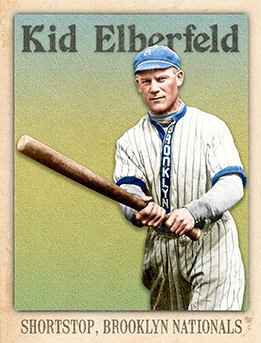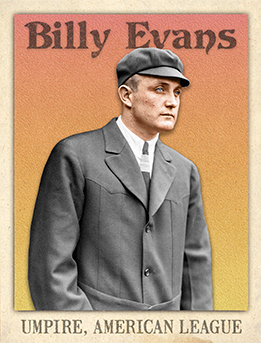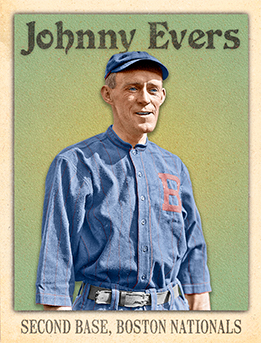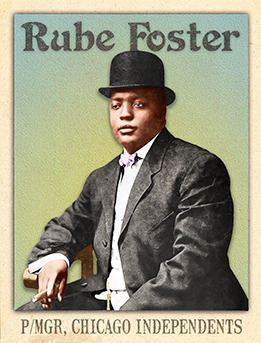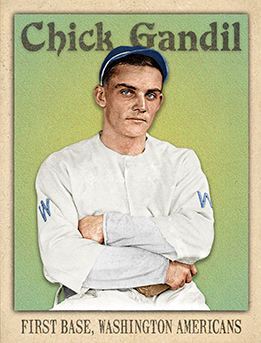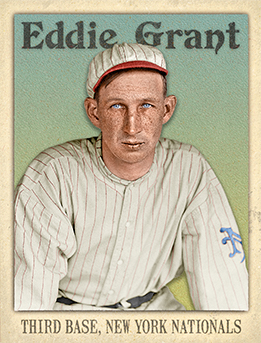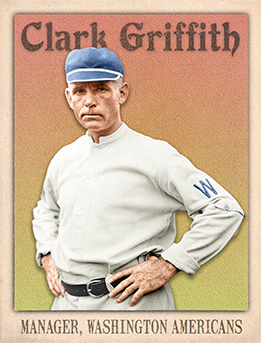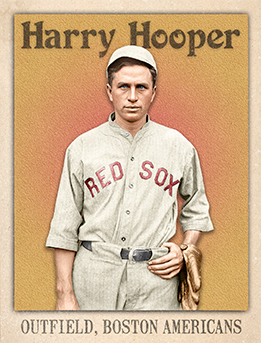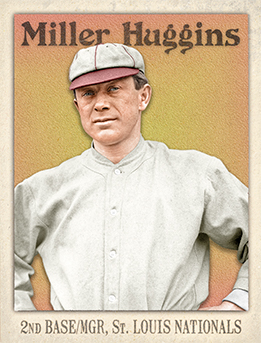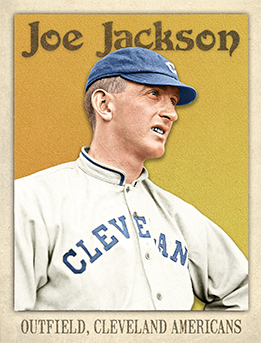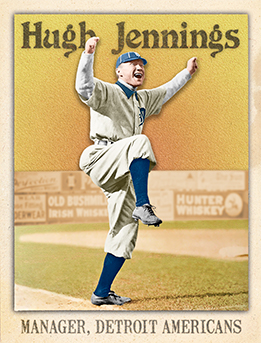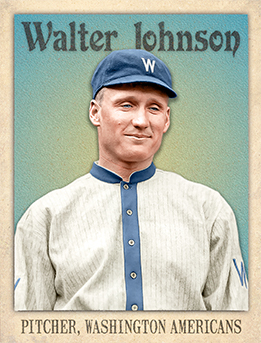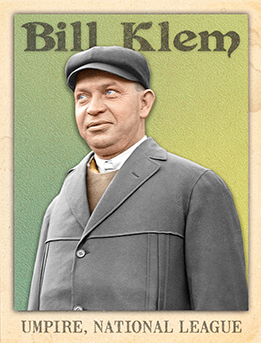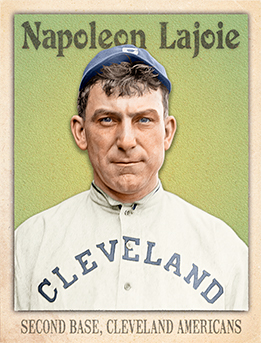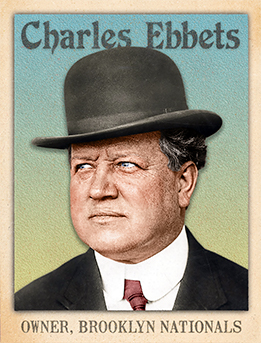
- Series: Diamond Heads '15
- City: Brooklyn
- Team: Robins
- League: National League
Charles Hercules Ebbets, Sr (1859-1925) started work for the new Brooklyn baseball team in 1883 and did just about every job possible before taking over operations in ’98. He became president of the Bridegrooms and was even the field manager that year. A tenth-place finish (out of 12 NL teams) ushered Ebbets out of the dugout and into the executive suite. A lifelong love of the game had drawn this architect/businessman/politician to the most menial of tasks for the franchise, working his way to the top upon the death of Charles Byrne. Twice he risked personal bankruptcy: in 1902 to keep the team in Brooklyn and later to buy the land and build the club’s new park. When the modest Ebbets suggested “Washington Park” as the name of the stadium, a Brooklyn Times reporter admonished him “Why don’t you call it Ebbets Field? It was your idea and nobody else’s, and you’ve put yourself in hock to build it.”
- The park he built would become the site of some of the most zany and beloved moments in all of sport
- Series: Diamond Heads '15
- City: Brooklyn
- Team: Robins
- League: National League
Norman Arthur Elberfeld (1875-1944), nicknamed the “Tabasco Kid” for his fiery temper and violent outbursts against umpires, covered 2nd base with a ferocity that daunted even Ty Cobb – who never slid head-first again after losing an encounter with Elberfeld’s spikes. Played mostly SS for 7 teams, 1898-1914 and was a solid hitter (.271 lifetime).
- Never afraid to take a spike, a punch or a pitch, he still ranks 13th on hit-batter list
- Career stats suffered from frequent suspensions and injuries
- Had a knack for mentoring young players, including rookie Casey Stengel
- Series: Diamond Heads '15
- League: American League
- Hall: National Baseball Hall of Fame
William George Evans (1884-1956) began as the youngest ML umpire and went on to a Hall of Fame career of whom a top Yankee pitcher said “He is the best, fairest and squarest umpire in the league.” A rare official with no playing experience, Evans quickly established his credibility in a rowdy era. In “one of the most disgraceful scenes ever witnessed on a ball field” his skull was fractured by a hurled bottle in a Browns/Tigers game.
- A gifted writer and analyst of the game, authored books and was an early sports columnist
- Went on to executive positions with teams and head of the minor league Southern Association
- Elected to Hall of Fame: 1973
- Series: Diamond Heads '15
- City: Boston
- Team: Braves
- League: National League
- Hall: National Baseball Hall of Fame
John Joseph Evers (1881-1947) was immortalized as the pivot man with Joe Tinker and Frank Chance in the most famous double-play combo of all time. Evers was a good-hitting, slick-fielding 2nd baseman, winning World Series with the Cubs and Braves. A fiery-tempered man, Evers was said to have had more impact on a team than any at his position.
- The quintessential “small ball” player, Evers excelled in bunts, steals and heads-up play
- Saved a pennant race for Chicago by calling ump’s attention to Fred Merkle’s “Boner”
- Elected to Hall of Fame: 1946
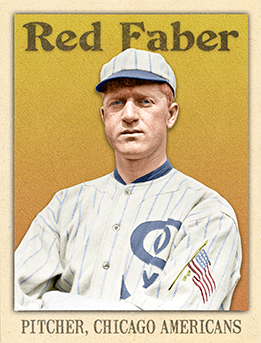
- Series: Diamond Heads '15
- City: Chicago
- Team: White Sox
- League: American League
- Hall: National Baseball Hall of Fame
Urban C. Faber (1888-1976) was the rare pitcher who thrived in both the Dead & Live Ball Eras, one of a handful to win 100 games in each. He was one of the 17 legal spitballers in the ‘20s. A lifelong White Sox, the 20-year ML veteran became the shining light in the gloom of the scandal-shrouded club, once winning 40% of the team’s victories (25) in 1921 while leading the AL in ERA. A smoker from age 8, Faber hated the chaw he used every time he pitched but he made the spitter dance so effectively he claimed he rarely had to use it. His skill at fooling batters was never more evident than when he shut down the Senators on 67 pitches in ‘15. No one has equaled his four WS decisions against NY in ’17, winning 3 including game 7.
- This thoroughly honorable man (dubbed by Babe Ruth “the nicest man in the world”) endured injuries and illness but survived to age 88
- Founded Baseball Anonymous to aid indigent players
- Elected to Hall of Fame: 1964
- Series: Diamond Heads '15
- City: Chicago
- Team: American Giants
- League: Independent
- Hall: National Baseball Hall of Fame
Andrew Foster (1879-1930) was “the foremost manager and executive in history of the Negro Leagues” according to his Cooperstown plaque. He is known by many as “the Father of Negro Baseball,” a title earned by decades of playing greatness on the mound, managing championship teams, and founding the Negro NL in 1920. John McGraw recruited Foster to instruct his pitchers. Foster is said to have taught Mathewson the screwball. His nickname may derive from his defeat of Waddell in one of many exhibitions with the “real” big leaguers.
- Honus Wagner said Foster was “one of the greatest pitchers of all-time”
- But it was his brilliance as an executive that left a legacy of greatness in African-American history as the league he founded finally gave a national platform for the talents of black players
- Elected to Hall of Fame: 1981
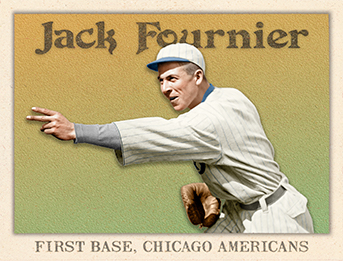
- Series: Diamond Heads '15
- City: Chicago
- Team: White Sox
- League: American League
John Frank Fournier (1889-1973) has been ranked by Bill James as the 35th-best first baseman of all-time. Yet, his inability to play the position competently left the managers of his five major league teams in a constant quandary. He got his ranking at the plate, not afield. Always a good hitter, as his career progressed, Jack put up numbers with the best of the era. His career BA was .313 in 15 ML seasons and he really soared when the Cardinals dealt him to Zack Wheat's Brooklyn Robins. From 1923-26 Fournier averaged .337 and slugged 82 homers. His performance with the bat only improved as he aged. A recent ranking of hitters in their Age 34 to 36 seasons shows Fournier among twenty of the best ever. In fact, only he and Gavvy Cravath failed to make the Hall after achieving what he did in his mid-thirties. And he was no slouch in his twenties. Jack began his professional endeavors with Seattle in the Northwestern League in 1908. The teenager knocked around the west coast until the White Sox came calling in 1912. In two years he was hitting .300 and rarely dipped below that threshold thereafter. Had his glove been as magnetic as his body, Jack may have played even more—he led the league in being hit-by-pitch three times.
- Fournier may well have been the most mis-matched player of his day. The stratagems of the Dead Ball era dictated many bunts, a particular weakness for the sturdy fielder. And one is left to imagine the hits he'd have had with a livelier ball
- Jack almost quit the game rather than report to the Robins. He relented and went on to the best years of his career, despite leading the NL in errors his first season in Brooklyn
- Series: Diamond Heads '15
- City: Washington, D.C.
- Team: Senators
- League: American League
Charles Arnold Gandil (1888-1970) was described in the Chicago Tribune in March 1917 as “the ideal type of athlete – a fighter on the field, a player who never quits under the most discouraging circumstances and … is one of the most dangerous batters in the league when a hit means a ball game.” This tribute heralded Gandil’s return to his original club, Charles Comiskey’s White Sox. He didn’t set the world on fire in ’17 and ’18 but the club became a strong favorite to win it all in 1919. Rife with dissension directed at the miserly owner, by his own admission in a 1956 SI account, Gandil led a conspiracy to throw the Series. Everything came undone and by 1921 eight Sox players were banned for life. Gandil admitted to being the main instigator of the affair but insisted the actual Series losses were unintentional.
- Was a stand-out first-baseman for Clark Griffith’s Senators
- Lifetime BA of .277
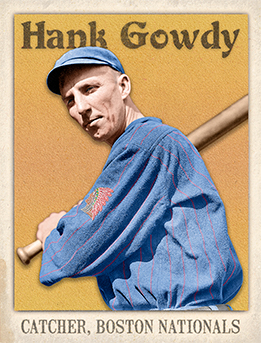
- Series: Diamond Heads '15
- City: Boston
- Team: Braves
- League: National League
Henry Morgan Gowdy (1889-1966) made his name on the ball field and his fame on the battlefield. A catcher and first baseman, Gowdy debuted with the Giants in 1910, getting into a few games over his first four seasons before claiming the starting catcher’s job with the Boston Braves in 1914. He became a key contributor to that “miracle” season as his team achieved a first: winning it all following their last-place finish in ‘13. This was far from the only “first” in Gowdy’s distinguished life and career. He would go on to become the first major leaguer to enlist in World War I, return a hero and tour the country relating his wartime experiences and then return to Boston. After a playing career spanning three decades, Gowdy would then sign up as a captain in WWII, the only player to serve in both conflicts. Again, Hank returned to the game he loved as a coach with Cincinnati, finally retiring in 1948.
- Having starred in the ‘14 Series, Gowdy played the goat when his error led to the Giants’ heartbreak loss to the Senators in 1924
- Another “record” for this great American player/warrior: received votes for induction to the HOF 17 times without success, exceeded only by Edd Roush who finally made it in
- Series: Diamond Heads '15
- City: New York
- Team: Giants
- League: National League
Edward Leslie Grant (1883-1918) had a cup of coffee replacing an ailing Nap Lajoie with the Indians at the end of the 1905 season, upon his graduation from Harvard. Caught on with the Phillies ’07-10, then played for the Reds and Giants thru 1915. An early enlistee for WWI, Grant became the 1st ML veteran to die in that conflict, leading a heroic search for the “Lost Battalion.”
- A Harvard lawyer (’09), Grant refused to holler “I Got It!,” preferring “I Have It!”
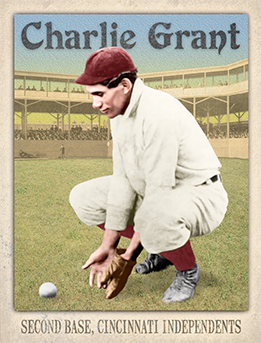
- Series: Diamond Heads '15
- City: Cincinnati
- Team: Stars (IND)
- League: Independent
Charles Grant Jr. (1874-1932) replaced Sol White at second base in 1896 when White left the Page Fence Giants, a move that came back to bite White's Cuban X-Giants later that year when Grant's team won the championship series 10 games to 5. Page Fence folded in '99 and Charlie moved to the Columbia Giants of Chicago. But is wasn't his prowess afield in the early Black leagues that brought Grant to the razor's edge of history. The smooth-fielding youngster worked in a hotel in Hot Springs, AR in the off-seasons where John McGraw's Orioles trained. McGraw, ever-voracious for talent, spied Grant playing pick-up games with co-workers and immediately judged him to be of major league caliber. The color-line was obdurate but McGraw seized on the ploy of passing Grant off as a Native American, even dubbing him “Tokohama” after a name he saw on the hotel's map. The scheme almost worked. Sol White tells the story of how McGraw's efforts to surreptitiously integrate the American League foundered when Baltimore went up to Chicago en route from spring training. Comiskey noticed that Grant's friends in town had shown up to applaud him and even sent a bouquet. Outed, McGraw had to yield to the league's segregation. White shared McGraw's esteem for Grant's ability: “I will give any 'fan' a good ten-cent cigar who will call my attention or, rather, recall my memory to an error on a ground ball or a muffed fly by Charley Grant.” His chance at national fame thwarted, Grant continued a very successful career in Black ball.
- Never a strong hitter, Grant always earned his keep at second. He died tragically, struck by a car that had blown a tire. In death, this great player received a measure of the recognition of which he was deprived by baseball's moguls. He is buried a short distance from Hall of Fame second-sacker Miller Huggins at Spring Grove Cemetery in Cincinnati
- Series: Diamond Heads '15
- City: Washington, D.C.
- Team: Senators
- League: American League
- Hall: National Baseball Hall of Fame
Clark Calvin Griffith (1869-1955) was a successful pitcher for over 20 years but had only just begun his baseball career. AL founder Ban Johnson prevailed on Griffith to take the helm of the NY entry into the new league in 1903. That began a tenure as manager and owner that lasted until Griffith’s death in 1955. With a showman’s touch and a veteran player’s savvy, Griffith turned around the D.C. franchise.
- Only one in history to be a player, manager and owner for over 20 years in each role
- Counted eight U.S. presidents as friends during his long tenure as owner of the Senators
- Elected to Hall of Fame: 1946
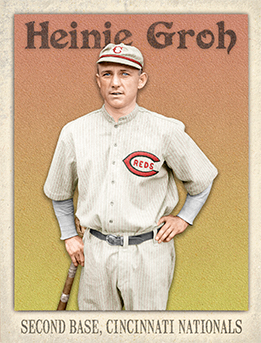
- Series: Diamond Heads '15
- City: Cincinnati
- Team: Reds (NL)
- League: National League
Henry Knight Groh (1889-1968) was one of the best all-around third baseman in baseball. He is considered the National League’s premier specialist at the hot corner during the Deadball Era in which he starred for the Giants and Reds. Groh set fielding records in numerous categories, some of which have never been exceeded in the long history of the Senior Circuit. As good as he was at his position, the diminutive Groh was even more effective at bat, wielding an unusual “bottle bat” to enable his small hands to bunt and hit-and-run with the best. Heinie came up with McGraw’s Giants in 1912 but was soon shipped to Cincinnati where he emerged as a talented lead-off-hitting second-baseman. When manager Buck Herzog moved Groh to third, his career skyrocketed. He chafed under the Reds’ leadership, holding out, getting a chance to return to NY, then having Judge Landis veto the deal lest a player gain actual leverage over ownership. In 1922 Groh finally rejoined his original team and helped them to the pennant.
- His performance in the Series that year was sensational, including a .474 average that Groh kept on his Ohio license plate the rest of his life
- Led the NL in double plays six times and fielding % five times, both still records
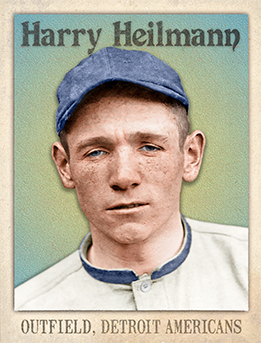
- Series: Diamond Heads '15
- City: Detroit
- Team: Tigers
- League: American League
- Hall: National Baseball Hall of Fame
Harry Edwin Heilmann (1894-1951) won the AL batting title four times. Had he scratched out a handful of singles in 1921 and ‘25, he would have been the only player to hit .400 four times. Teammate Ty Cobb considered him second only to Hornsby among right-handers. He was the last right-hander to hit .400 (1923). Harry came out of the PCL to sign with Detroit in 1914 as an outfielder, vying for playing time amongst stalwarts Ty Cobb, Sam Crawford and Bobby Veach. Following a stint in the wartime Navy, Harry returned in 1919 as a first baseman (he would move back to the outfield in 1921) and launched an extraordinary run as one of the most dominant hitters of any era. “Slug” (being slow afoot) was indeed a slugger, but of the line-drive variety, compiling a career average of .342, twelfth best in baseball. Yet, his induction to Cooperstown was delayed until the year after he died based on a bias against 20’s hitters who were seen as feasting on the “live-ball.” Heilmann’s lifelong friend Cobb lied to him on his deathbed that he had made it into the Hall, a fib that became truth the following year.
- Arthritis took a toll in his later years. Heilmann was traded to the Reds in 1930 where he still hit .333 that year
- Elected to Hall of Fame: 1952
- Series: Diamond Heads '15
- City: Boston
- Team: Red Sox
- League: American League
- Hall: National Baseball Hall of Fame
Harry Bartholomew Hooper (1887-1974) anchored right field for one of the best outfields in baseball for the Red Sox with Tris Speaker and Duffy Lewis from 1910-15. Still holds Boston club records for triples and SBs. Entered the Hall of Fame in 1971 with 2466 hits and a career .281 BA.
- First player to lead-off both games of a doubleheader with a home run
- With Heinie Wagner, was part of a record four Sox World Series championships
- Elected to Hall of Fame: 1971
- Series: Diamond Heads '15
- City: St. Louis
- Team: Cardinals
- League: National League
- Hall: National Baseball Hall of Fame
Miller James Huggins (1879-1929) played 2B for the Reds and Cards (1904-16), then managed the Cards and Yankees during the latter’s dominant decade, winning 6 AL pennants and 3 World Series. Despite a low-key style, Huggins shook up the NY roster, drawing heavily from the Red Sox and even reined in the mighty Babe, laying the groundwork for Murderers’ Row.
- Presided over consecutive World Series sweeps in 1927 & 28
- Following Huggins’ untimely death at age 50, all AL games were canceled in tribute
- Elected to Hall of Fame: 1964
- Series: Diamond Heads '15
- City: Cleveland
- Team: Naps
- League: American League
Joseph Jefferson Wofford Jackson (1887-1951) had the “perfectest” swing according to Babe Ruth who copied it. After nearly a century of more contenders, many would still say Shoeless Joe was the purest hitter ever to wield a baseball bat. Expelled from baseball by Judge Landis, Jackson lives in infamy despite demonstrating prowess at the plate and grace afield. While he will ever be branded with the “Black Sox,” Jackson stirred passions that still echo in baseball today.
- Still ranks as the third-highest career batting average in history (.356)
- His .408 average in 1911, his rookie season, is sixth-highest in the modern era
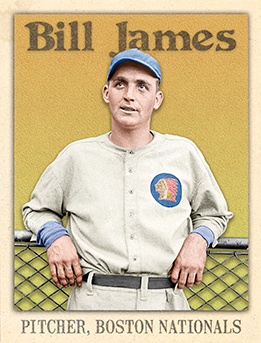
- Series: Diamond Heads '15
- City: Boston
- Team: Braves
- League: National League
William Lawrence James (1892-1971) had a season for the ages in 1914. His woeful Boston Braves hadn’t seen a winning campaign in over a decade and for years had been trapped in the all-too-public hell reserved for teams that can’t get within 50 games of the leaders. No one could have imagined the year that followed James’ rookie season where he had gone 6-10. No one to this day can completely fathom the wonder that became the “Miracle Braves.” The lowliest of teams won it all, pennant and Series. And Seattle Bill James eclipsed his fellow ace Dick Rudolph. His sophomore year produced a 26-7 record, .788 winning percentage, 1.90 ERA with 156 strikeouts in 332 innings. He won two Fall Classic games in three days. He was on fire. Yet, he lacked the fire in the belly that might have led to a great career. He tired of the travel rigors, complaining of it as “hard and disagreeable work.” After winning 32 games in two years, he and his brilliant arm were done. He soon returned to the west coast for minor league assignments, a stint in the wartime infantry and retirement.
- James was stunning with the Seattle Giants in 1912, winning 29 and a ticket to Beantown
- Series: Diamond Heads '15
- City: Detroit
- Team: Tigers
- League: American League
- Hall: National Baseball Hall of Fame
Hugh Ambrose Jennings (1869-1928) became the premier ML SS for the Orioles in the mid-90s, hitting .401 in ’96. Nearly killed by an Amos Rusie quick-pitch, this survivor returned to be hit 46x in ’96. Irrepressibly good-natured and brilliant, Jennings was an attorney and manager after his playing days, guiding the volcanic Ty Cobb to his phenomenal career.
- Still holds record for being hit by pitch (287)
- Is credited with inventing the platoon system
- Elected to Hall of Fame: 1945
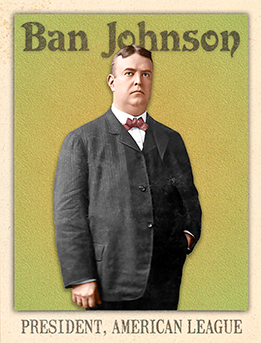
- Series: Diamond Heads '15
- League: American League
- Hall: National Baseball Hall of Fame
Byron Bancroft Johnson (1865-1931) was a big man who embodied bigger ambitions. He built the Western League into competitive shape in the 1890s and virtually forced the NL to accept his new creation as an equal. He presided over the new AL for the first two decades of the 20th century. In the aftermath of the Black Sox scandal, Judge Landis became the new czar. By 1927 Johnson was out. But what a legacy he left! His unstinting zeal for cleaning up the rowdiness of that era did not prevent him from shameless opportunism and subterfuge as he methodically put the pieces in place to rival the senior circuit. By dint of his larger-than-life persona, Johnson revolutionized the game: umpires became the true arbiters on the field, rioting players and fans no longer held ballparks hostage to violence, and the pernicious effects of gambling were largely curtailed.
- Charted the new league with his pal Comiskey but bringing on Connie Mack was a key move
- The 1903 World Series stood as the emblem of victory for the upstart AL and Ban Johnson
- Elected to Hall of Fame: 1937
- Series: Diamond Heads '15
- City: Washington, D.C.
- Team: Senators
- League: American League
- Hall: National Baseball Hall of Fame
Walter Perry Johnson (1887-1946) played his entire 21-yr career for the Senators then managed them for 4 more. Ty Cobb’s first impression was of a “rube out of the cornfields.” But when the rube threw “The thing just hissed with danger.” Cobb wasn’t the last player to be stunned by this man’s fastball: Most shut-outs in MLB, 2nd in wins, 4th in complete games, etc.
- Only member of 3000 SO club until Bob Gibson joined in 1974
- Still holds record 12x league-leader in strikeouts
- Elected to Hall of Fame: 1936
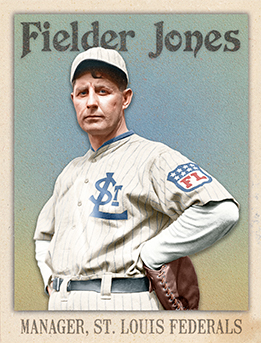
- Series: Diamond Heads '15
- City: St. Louis
- Team: Terriers
- League: Federal League
Fielder Allison Jones (1871-1934) made his name in baseball's history books by eking just enough results from minimal production to win the White Sox their first Series title in 1906. That club has forever been known as the “Hitless Wonders,” a squad of light-hitting scrappers who, under Jones' able direction, were able to best the powerful Cubs. The '06 Series was noteworthy as the first cross-town matchup and the only one to pair the Chicago franchises. It was also one of the greatest upsets, with the Cubs' bats held in check by Ed Walsh and other Sox hurlers. In taking the final two contests, Jones' crew stepped out of character and rapped 26 hits. Overall, though, his boys lived up to their “hitless” reputation, managing only a .198 average for the series. Jones was one of the most adept managers of his era in teaching “inside baseball” or “small-ball” whereby his charges frequently plated runs without the benefit of hits in the inning. Jones was a blue-blood, tracing his heritage to Scotland's Robert Bruce on one side and a Mayflower landing on the other. He had university training that perhaps predicted the cerebral approach Fielder always brought to the game. He had come out of rural Pennsylvania to play for Brooklyn where he helped the team to pennants in 1899 and 1900. Moving to Chicago only continued his winning ways, gaining another gonfalon in 1901, the new American League entry's first. As a player, Fielder had made a fine record, leading the Superbas in 1900 and hitting .285 overall.
- Jones moved from Chicago to St Louis when the Federal League and the Terriers beckoned him back to the majors in 1914 and he remained with the Browns through the 1918 season
- Though the White Sox were a poor hitting team in '06, they had come a long way under Jones' leadership. A writer of the day lauded him as having introduced “speed, psychology and daring into the game.”
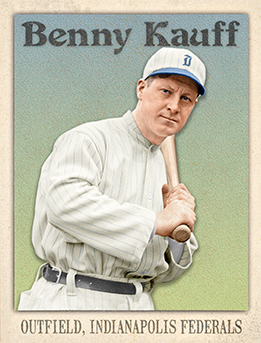
- Series: Diamond Heads '15
- City: Indianapolis
- Team: Hoosiers (FL)
- League: Federal League
Benjamin Michael Kauff (1890-1961) came oh so close to owning the Big Apple. The brash, dapper young outfielder had all the tools, all five to be exact. And he had attitude. And style. For unknown reasons, the Highlanders gave up on the rookie in 1912 after a mere five games and consigned him to the minors. Kauff then detoured to the Federal League in ‘14-15, tearing up the league in all offensive categories. John McGraw had tried to get Benny before losing out to the upstart Feds and finally succeeded when the circuit folded. Sadly for Kauff, his press notices as the “Ty Cobb of the Federal League” rang hollow when he could only muster a .264 average in 1916 for the Giants. He raised that average over .300 until the war intervened but never set the world on fire. Caught up in the maelstrom of 1919 shadiness, Kauff gained a reputation for dishonesty that would haunt him when he faced felony theft charges the next year.
- Despite being exonerated with McGraw’s help, Ban Johnson and Kenesaw Landis didn’t buy it. The Black Sox affair had created a climate where the Judge would brook no hint of scandal and Kauff was banned from the game
- Series: Diamond Heads '15
- League: National League
- Hall: National Baseball Hall of Fame
William Joseph Klem (nee Klimm) (1874-1951) was the great founding-father of baseball umpiring. He brought a level of expertise and dignity that helped transform officiating and the game itself. And he was colorful: “It ain’t nothin’ till I call it;” “Gentlemen, he was out because I said he was out;” and “Son, when you pitch a strike, Mr. Hornsby will let you know.”
- Joined the NL crew in 1905, worked a record 18 World Series (no one else did more than 10)
- Was the longest-tenured and oldest umpire until exceeded in both by Bruce Froemming
- Elected to Hall of Fame: 1953
- Series: Diamond Heads '15
- City: Cleveland
- Team: Naps
- League: American League
- Hall: National Baseball Hall of Fame
Napoleon Lajoie (1885-1959) joined the American League at its inception and became its first superstar en route to a Hall of Fame career as one of the best all time 2nd basemen. In that first year of the junior circuit, Lajoie set a record never exceeded in the AL with a .426 BA (also never exceeded in the modern era in the NL). Won the Triple Crown in 1901 and 4 more AL batting titles.
- Only Cobb, Ruth, Wagner, Mathewson and Johnson preceded him In the first HOF balloting
- Was such a hit with Cleveland fans, they voted to name the team the “Naps” in 1903
- Elected to Hall of Fame: 1937

